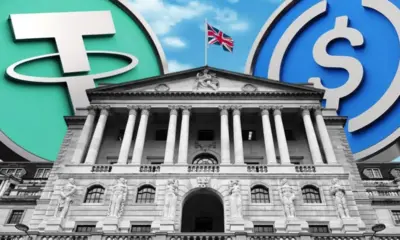Tech
London Policy Circles Assess Cross Border Digital Pound Models Following Global Fintech Trends

Introduction
In London’s financial and policy circles, the discussion around a potential digital pound has entered a new and more strategic phase. After several years of consultation and research, UK policymakers, central bankers, and financial technology experts are now examining models for cross-border interoperability that could position the country at the forefront of digital currency innovation.
The conversation reflects a growing recognition that the future of international finance is being shaped by digital infrastructure and data-driven settlement systems. With several major economies advancing their own central bank digital currency initiatives, the UK faces pressure to ensure that its monetary framework remains globally competitive. The government’s ongoing digital pound review seeks to balance innovation with financial stability, addressing technical, regulatory, and geopolitical dimensions of cross-border payments.
The Case for a Digital Pound
The idea of a digital pound, sometimes referred to as a central bank digital currency, has been under exploration since the Bank of England and HM Treasury launched their joint task force in 2021. The rationale behind it is to modernize the UK’s monetary system, improve payment efficiency, and enhance financial inclusion in an increasingly cashless society.
However, the debate has shifted from whether a digital pound is necessary to how it should be designed. With the domestic payments landscape already highly advanced through private fintech solutions, policymakers are focusing on cross-border functionality as the next frontier. A well-designed digital pound could reduce transaction costs, speed up settlements, and increase transparency in international trade flows.
The Bank of England’s most recent discussion papers have emphasized the need for interoperability between different national systems. This would ensure that digital currencies issued by central banks can communicate across borders, allowing businesses and consumers to transfer money seamlessly without relying on intermediaries or complex foreign exchange processes.
Cross-Border Payments and Economic Efficiency
Cross-border payments remain a key area where inefficiencies persist. Traditional international transfers can take days to complete, involve multiple intermediaries, and incur high fees. For a country like the UK, whose economy depends heavily on global trade and financial services, improving these mechanisms is essential to maintaining competitiveness.
A digital pound designed for cross-border compatibility could streamline payments between banks, corporations, and individuals by using programmable features that automatically verify and settle transactions. Such systems could also improve transparency and traceability, helping regulators monitor financial flows without compromising privacy.
Economists note that faster and cheaper cross-border payments would particularly benefit small and medium-sized enterprises that currently face high transaction costs when trading internationally. In addition, integrating digital currency systems with existing fintech networks could enhance liquidity and reduce settlement risks in wholesale markets.
Regulatory and Institutional Considerations
Implementing a cross-border digital currency system presents complex policy challenges. Regulators must ensure that such systems maintain financial stability and security while preventing illicit activity. The Bank of England and the Financial Conduct Authority are currently assessing how existing regulatory frameworks can be adapted to accommodate digital settlement instruments.
One major consideration is how to preserve monetary sovereignty while promoting interoperability. If the UK’s digital pound were designed to function seamlessly with other digital currencies, there would need to be strong governance mechanisms to manage data sharing, exchange rates, and cross-border compliance.
The Treasury’s Digital Finance Roadmap outlines the government’s intention to position the UK as a global hub for digital asset innovation while maintaining robust oversight. This balance will be crucial to ensuring that the digital pound enhances rather than disrupts the stability of the financial system.
Technology and Infrastructure Development
Developing a cross-border digital currency also requires advanced technological infrastructure. The Bank of England’s technology teams, working with private-sector partners, are exploring blockchain and distributed ledger technologies as potential frameworks for settlement. These systems offer real-time verification, traceability, and the ability to execute programmable transactions that can reduce human error.
However, experts caution that not all blockchain architectures are suitable for large-scale monetary operations. Scalability, energy efficiency, and cybersecurity are major factors in determining the final design. The infrastructure must also integrate smoothly with existing banking systems and fintech platforms to avoid fragmentation in the payments ecosystem.
The private sector is expected to play an active role in this transformation. London’s fintech firms, which already lead in areas such as payment processing and financial analytics, are contributing to pilot studies and technical consultations. Their involvement could help ensure that the digital pound aligns with market realities and consumer expectations.
Global Coordination and Strategic Partnerships
The UK’s progress on digital currency design is taking place alongside similar initiatives around the world. Several central banks, including those in Europe and Asia, are testing interoperable systems that allow digital currencies to function across borders. The Bank for International Settlements has been coordinating research among central banks to establish shared technical standards.
For the UK, this global collaboration is both an opportunity and a necessity. As one of the world’s major financial centers, London must ensure that its digital currency infrastructure can connect with other economies to facilitate international commerce. Strategic partnerships with major trading partners will be essential to establishing a digital payments network that promotes efficiency and trust.
The move toward digital currencies also reflects broader trends in global finance. As data-driven technologies reshape markets, monetary policy and international payment systems must evolve to remain effective. For the UK, leadership in this area could enhance its influence in setting global standards for digital financial governance.
Public Trust and Privacy Concerns
One of the most sensitive aspects of the digital pound discussion involves data privacy and public trust. Policymakers recognize that for any digital currency to succeed, it must guarantee strong protections against surveillance and misuse of personal data. The Bank of England has repeatedly stressed that a digital pound would not replace cash and would maintain user privacy within a regulated framework.
Public consultations have revealed mixed attitudes toward digital currency adoption. While many consumers appreciate the potential for faster and cheaper transactions, concerns persist about cybersecurity, government access to financial data, and the risk of system outages. Building public confidence through transparency and robust oversight will therefore be a central pillar of the reform process.
Outlook and Policy Implications
Over the next two years, the UK is expected to expand pilot programs exploring digital currency applications in wholesale finance, cross-border trade, and consumer payments. Policymakers are likely to focus on interoperability testing with foreign systems and private fintech platforms.
The lessons learned from these initiatives will shape the ultimate decision on whether to launch a digital pound and how to structure its governance. Analysts suggest that early implementation in niche areas such as interbank settlements or trade finance could pave the way for broader public adoption later in the decade.
Conclusion
The United Kingdom stands at a pivotal moment in its journey toward a digital monetary future. By focusing on cross-border interoperability and data-driven efficiency, London’s policymakers are aiming to secure the country’s role as a leader in global financial innovation.
The challenge will be to balance innovation with regulation, openness with sovereignty, and speed with security. If the UK succeeds, the digital pound could become a cornerstone of the next generation of financial infrastructure, transforming how money moves across borders and how economies connect in an increasingly digital world.






















